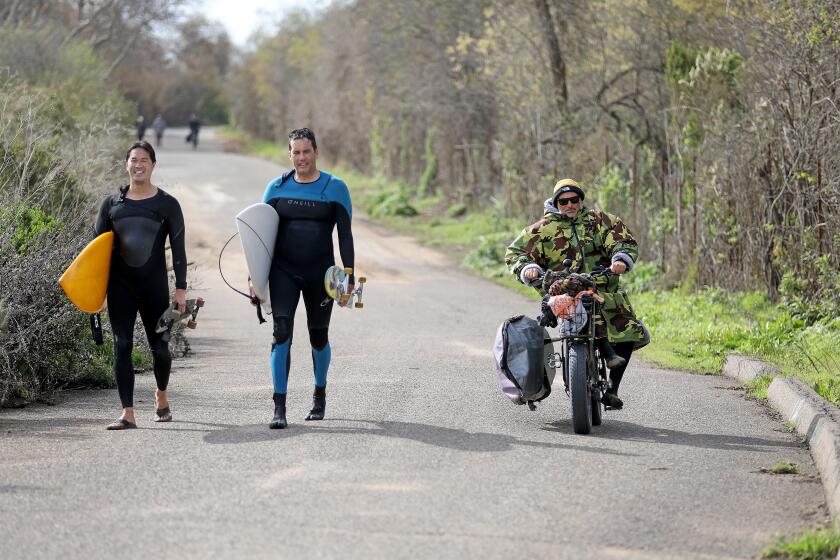In the South Bay, e-bikes are restricted along the beach. Yet they’re still everywhere
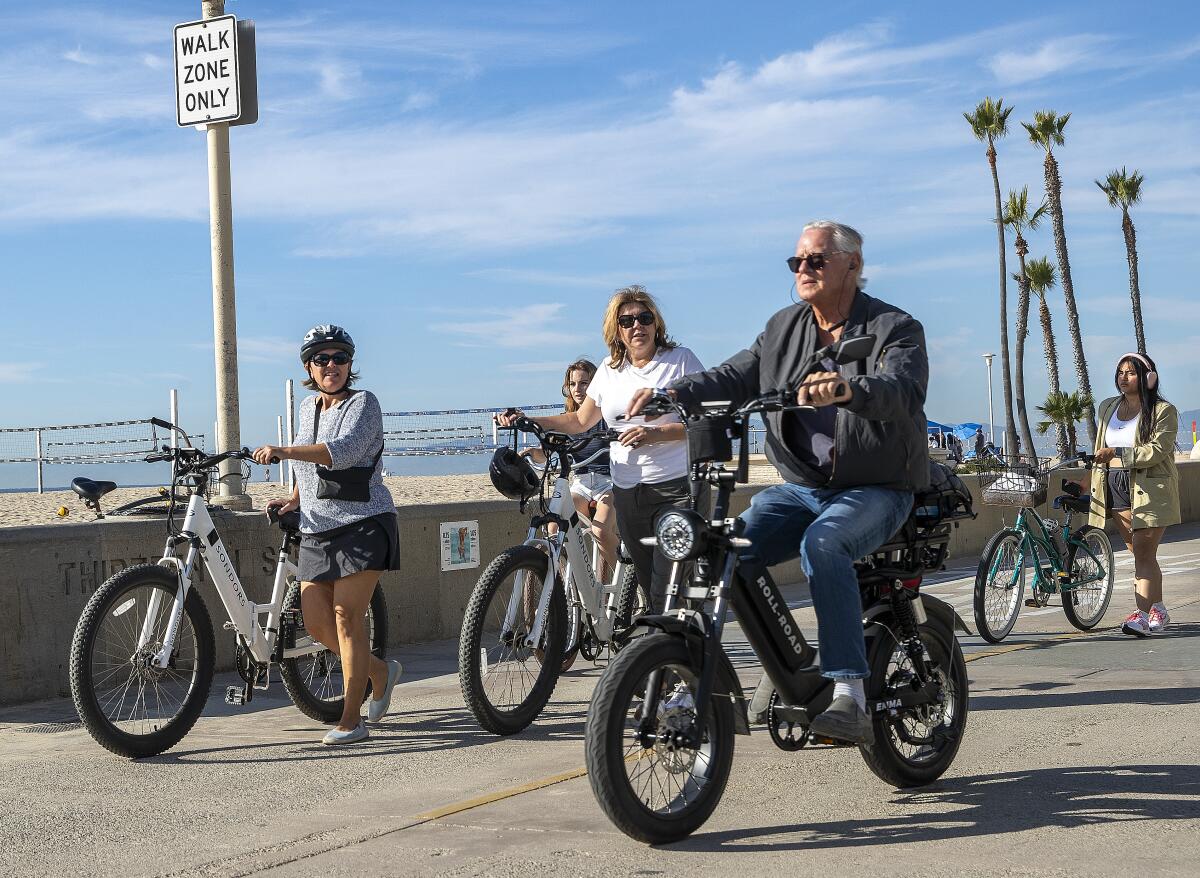
Glenn Kumro was sitting astride his bike on the Strand in Hermosa Beach after stopping to talk to some friends when something slammed into him from behind.
He tumbled over his handlebars, breaking his shoulder, fracturing his hip and losing two teeth.
A speeding e-biker had hit him, Kumro said recently. The e-biker apologized and admitted to being distracted before riding off.
“Just imagine if it was a kid who got hit,” said Kumro, a 58-year-old disabled veteran, who lived in Hermosa Beach at the time of the accident two years ago and has since moved to Northern California. “Those bikes go way too fast.”
A careless rider on a regular bike could also cause trouble on the beachfront sidewalk that on some stretches is teeming with cyclists and pedestrians as well as skateboarders, rollerbladers and dog walkers.
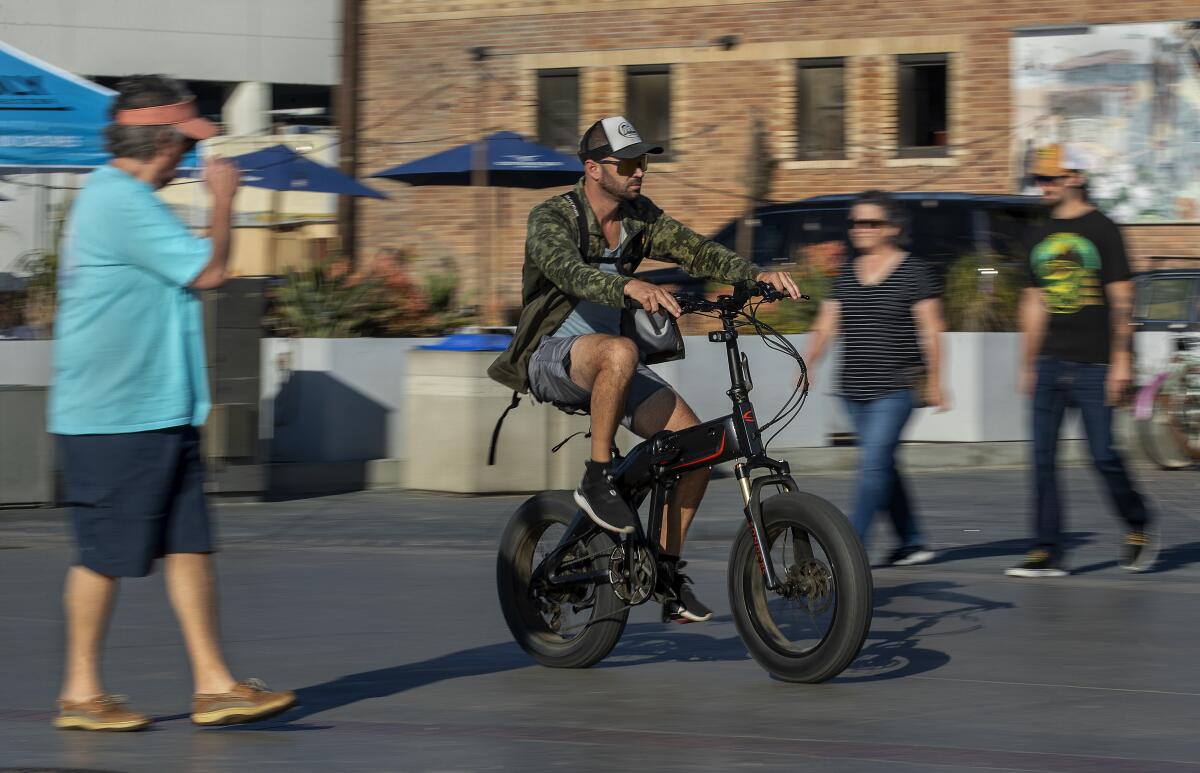
But e-bikes can go up to 28 mph — well above the Strand’s 8 mph speed limit — and are usually heavier and bulkier than regular bikes. They have become increasingly popular in recent years, and some coastal cities have restricted their use.
On the Strand, Hermosa Beach prohibits the use of electric power while permitting e-bikes as long as they’re pedaled manually. Since September, Manhattan Beach has completely banned e-bikes on the Strand, allowing them on city streets and the 22-mile Marvin Braude Bike Trail, which also hugs the coastline.
Redondo Beach, which has a beachfront path separate from the Strand, doesn’t have its own e-bike regulations, but e-bikers must abide by state laws requiring them to follow the same rules as regular cyclists.
E-bikers and e-bike shop owners say the bikes are safe when ridden responsibly. But the number of unsafe riders in the South Bay has left city officials and police grappling with how to keep everyone safe. In Orange County, an abundance of e-bikes on the boardwalk has resulted in collisions with pedestrians and dogs and prompted residents to call for stricter regulations.
The growing popularity of e-bikes has created a conundrum for Orange County cities as they try to balance state climate goals with concerns about rider and pedestrian safety.
Some South Bay residents say the rules aren’t enforced and the bikes are disruptive. They say they often see e-bikers weaving around other cyclists and exceeding the speed limit.
Police officials say e-bike laws are hard to enforce on the Strand, where motorcycles and radar guns aren’t practical. There also aren’t enough officers to routinely station someone there.
“Without a heavy police presence, people are going to do what they want to do,” said Erik Mar, 70, a Manhattan Beach resident who cycles along the coast every day. “It’s kind of lawless.”
Redondo Beach resident Carlos Hernandez, 48, rides his electric bike along the coast nearly every weekend. He starts in the Hollywood Riviera in Redondo Beach and heads north to Pier Avenue in Hermosa Beach.
“I use electricity when I need to,” he said — even when he’s on the Strand, where electric power is prohibited. It’s not an issue as long as he’s not riding recklessly, he said.
Hernandez’s friends Sam Valencia and Michael Pacheco, who also live in Redondo Beach, often join him for rides by the beach. Valencia, 48, has a regular bike and is considering buying an e-bike for his 12-mile round-trip commute to El Segundo, where he works for toy company Mattel.
“They go too fast,” he said of e-bikes on the Strand. “They just need to follow the flow down here. It’s not a race. ... If you want to ride fast, get on the road.”
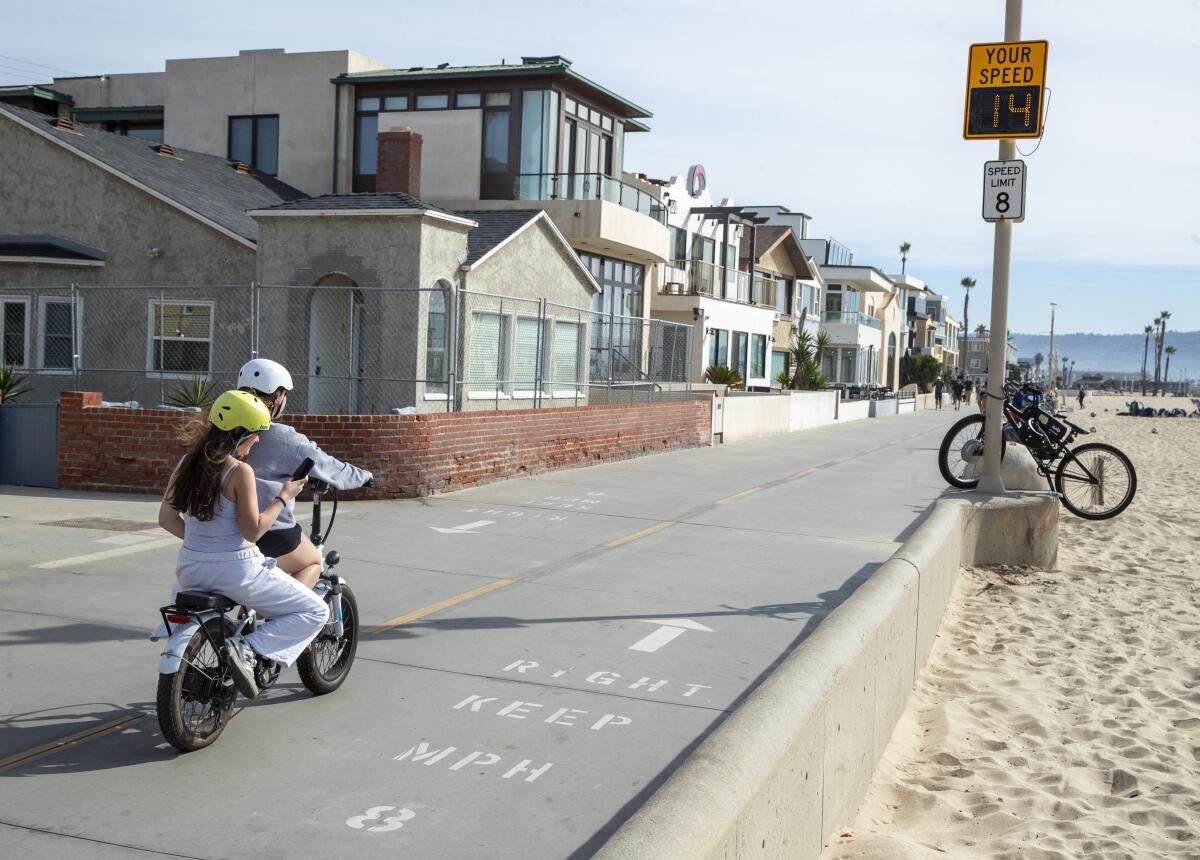
Pacheco, 50, rides an e-bike and says it’s not a big deal to occasionally use electric power on the Strand. He’s seen e-bikes explode in popularity, he said, and knows they can be dangerous when not handled carefully.
All three friends said the reckless riders they see are usually teenagers who speed, race each other and disregard road signs.
Recently, Redondo Beach City Councilman Zein Obagi was walking with his fiancée on his city’s beachfront bike path when a young person on an e-bike sped past them, weaving around pedestrians and other cyclists.
“If he hits somebody, that’s going to be a very tragic accident,” Obagi said. “It is a serious concern of the residents here, and people want something done about it.”
Obagi said the number of e-bikes in the South Bay has “blown up” over the last year. He described their increasing popularity as a double-edged sword.
“It’s a dream to have environmentally friendly micro-transit,” he said, “but it’s a nightmare to have a kid driving 25 miles per hour on an electric bike.”
Obagi said he and his fellow council members support stricter statewide regulations on e-bikes but don’t plan to implement municipal rules in Redondo Beach. The city doesn’t have the resources to set up its own licensing program, he said, and a speed limit would be difficult to enforce. He referenced a speed limit recently implemented in Manhattan Beach, which has not yet resulted in any citations.
He doesn’t blame police for a lack of enforcement — they need to work with parents and schools to make e-bikes as safe as possible, he said.
Hermosa Beach Mayor Justin Massey raised the issue of e-bikes at a City Council meeting Oct. 10, asking Police Chief Paul LeBaron about enforcement.
“We’ve dedicated so much of our time, attention and resources to the Strand in particular,” LeBaron responded. “We know that there’s threats to public safety down there … it’s the one place in the city that actually brings pedestrians and vehicles together, ” he said, referring to e-bikes, regular bikes and skateboards.
In addition to the difficulties of patrolling a narrow, crowded path, it can be hard to tell if e-bikers are using their motors or just pedaling, LeBaron said in an interview.
And pursuing a speeding biker can be dangerous.
“In order for officers to catch that person, they essentially have to break the same rules they’re trying to enforce, endangering everyone on the Strand,” LeBaron said.
Still, there have been no reported collisions on the Strand this year or last, which LeBaron attributed to effective policing.
“We’d be talking about tragedies right now if we weren’t doing what we could,” he said.
In early September, the Manhattan Beach City Council adopted e-bike regulations, including a ban on riding on the Strand, a 15-mph speed limit on the Marvin Braude Bike Trail and prohibitions on racing, stunts and riding on sidewalks.
“While e-bikes have become popular and are a great way to reduce our reliance on cars, pollution, and traffic, they aren’t toys and can be dangerous when not operated properly,” Manhattan Beach Mayor Richard Montgomery said in a statement.
The new ordinance has not led to any citations on the Strand or the Marvin Braude trail so far this year, according to the city clerk’s office.
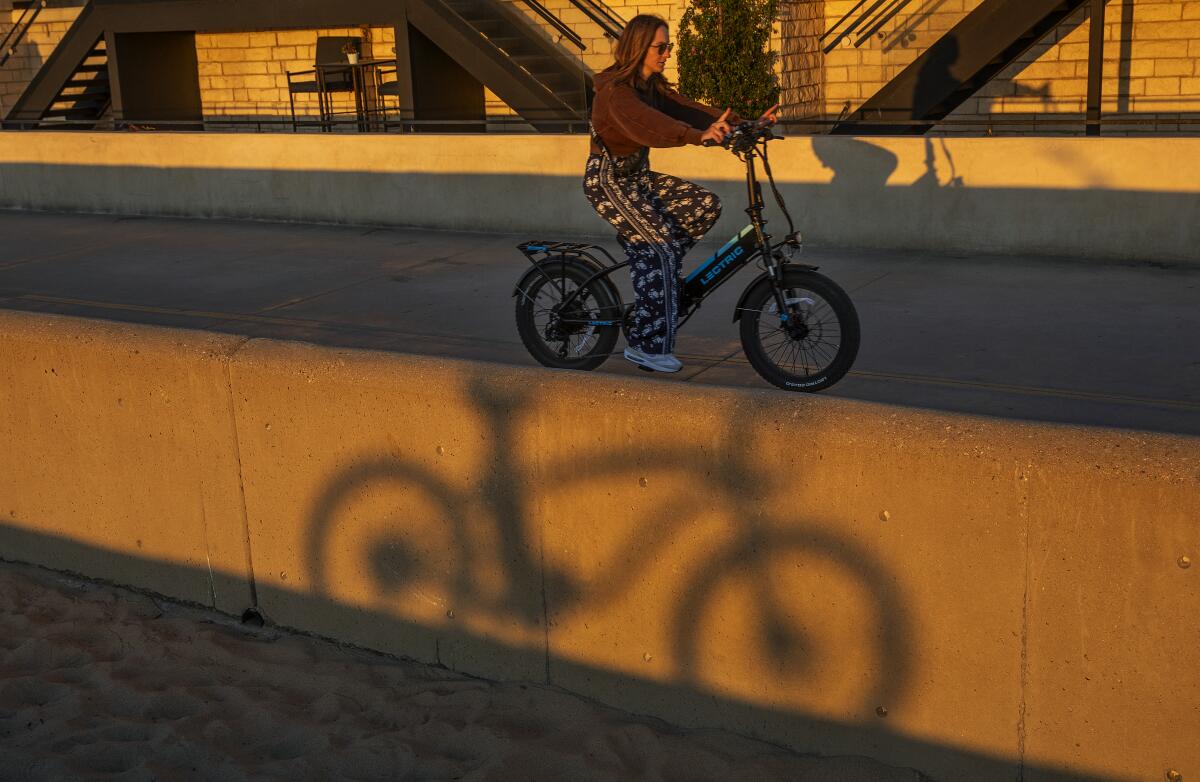
In February, state Assemblymember Tasha Boerner Horvath (D-Encinitas) introduced a bill that would eventually create a licensing program with a written test for riders without a driver’s license, as well as state-mandated e-bike training. It would also prohibit children under 12 from riding e-bikes.
The Redondo Beach City Council is drafting a letter in support of the bill, Obagi said.
More statewide e-bike laws are desperately needed, said Redondo Beach Police Chief Joe Hoffman.
“Unfortunately, the technology for e-bikes has outpaced the legislation in the state of California,” he said. “It has put police departments at a disadvantage.”
More to Read
Sign up for Essential California
The most important California stories and recommendations in your inbox every morning.
You may occasionally receive promotional content from the Los Angeles Times.

